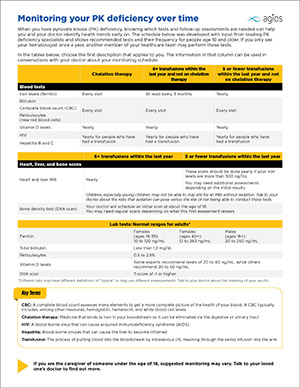Caring for someone with
PK deficiency
As the parent or caregiver of someone with PK deficiency, you have many roles to fill
Appointments, emotional support, sick days… the calendar can become very full, very quickly. And then there
are other roles you may play: coworker, spouse, parenting other children.
Your doctor will provide medical advice, but having a good knowledge base helps ensure clear communication as
you work with them to get your loved one the care they need. It also helps make sure everyone else on your
loved one’s team—family, friends, and teachers—is on the same page when it comes to responding to challenges
your loved one may face.
As with adults, symptoms and complications can vary widely between children
Signs and symptoms to look out for
- Due to fatigue, babies may not be as interested in feeding
- Underfeeding, plus the fatigue PK deficiency can cause, may lead to irritability
- Talk to your child’s doctor about how PK deficiency could affect growth, so you can put a plan in place
- Hemolytic episodes can be caused by infections and are therefore more frequent in childhood
- Episodes may lead to the worsening of everyday symptoms of PK deficiency
- Blood tests can help reveal the full extent of any complications resulting from an episode
- Jaundice can be difficult for children and teens because of others’ reactions
- Enlist family and friends in supporting your child by helping them to understand why jaundice occurs. Talk to teachers about the possibility that this symptom might trigger bullying
- Increased jaundice is a sign of red blood cells breaking down. This breakdown of red blood cells can be accompanied by other symptoms, such as fatigue
- In addition to jaundice, high bilirubin levels may cause gallstones.
Symptoms include abdominal pain, nausea, and vomiting
It’s important to know what symptoms to look for, so you can keep your child’s healthcare team informed. New or worsening symptoms can mean PK deficiency isn’t under control. This could mean it’s time to reevaluate the management plan.
tools you can use to help manage your child’s PK deficiency

Use the MyPKD mobile web app to help track your child's daily symptoms, save reports, and share updates with your healthcare team and others
Make a myPKD account
Make sure your child is properly being monitored using our Monitoring Guide
Download nowPK deficiency frequently asked questions for kids
Your child may ask questions about their condition. These questions and answers can be the start of building their knowledge.
Why do I have PK deficiency?
Everyone is born with certain traits, such as the color of their eyes or the shape of their nose. Traits come from your parents. For example, your eye color depends on what traits you get from both of your parents. PK deficiency is another trait you can be born with.
Why doesn’t everyone in my family have PK deficiency?
For someone to be born with PK deficiency, both of their parents have to have a trait that causes it. Sometimes, kids may only get one trait or no traits from their parents. Kids who are born with PK deficiency received the trait from both of their parents.
What causes PK deficiency?
Every cell in your body has a job to do. If one type of cell can’t do its job right, it can make you sick. With PK deficiency, red blood cells go away too quickly. That means you don’t have as many red blood cells as you need.
What are red blood cells?
Red blood cells are tiny cells that move through your blood. They deliver oxygen to every part of your body. Our body needs oxygen to work properly. We get oxygen by breathing air into our lungs. Red blood cells take the oxygen from our lungs and carry it to all the parts of our body, such as our brains, our hearts, and even our fingers.
Why do I get so tired?
All the parts of your body need oxygen to do their jobs. Because you have PK deficiency, you don’t have enough RBCs. Without enough RBCs to carry oxygen, your body doesn’t get enough energy. This makes you tired.
Why do my skin and eyes become yellow?
When red blood cells go away too quickly, they can leave substances behind in your blood. One of these substances is called bilirubin (bil-ih-roo-bin). Too much bilirubin can turn your skin and eyes yellow.
Why do I get blood transfusions?
A blood transfusion is a way to give you more red blood cells. Red blood cells can be added (transfused) into your blood. There, they help take the place of ones that went away too soon. They work with the red blood cells you have and help them do their job.
Not everyone with PK deficiency needs transfusions. Your doctor will recommend what’s right for you.
Why do I get chelation therapy?
When red blood cells go away too soon, they can also leave behind iron (also called ferritin) in your bloodstream. Too much iron can make you sick or hurt your heart or liver. So, your doctor gives you medicine that chelates (key-lates) the iron. That means it binds to the iron, so that you can get rid of it when you go to the bathroom. Transfusions can cause iron to build up too.
Why do I have to go to the doctor so much?
Your doctor needs to check on your health, and the health of your blood, to help prevent problems. When your blood cells break down too fast, they can make you sick in other ways. Your doctor wants to see you often to help you stay as healthy as you can be.
DID YOU KNOW?
As your child gets older, encourage them to interact directly with their healthcare team. It’s important that they feel comfortable asking questions, or for more explanation. Care for their PK deficiency will be a constant, so making sure they can speak up for themselves when they’re younger may make managing the responsibility easier in adulthood.
Looking for more information on PK deficiency?
Explore additional resources for caregivers
See resources